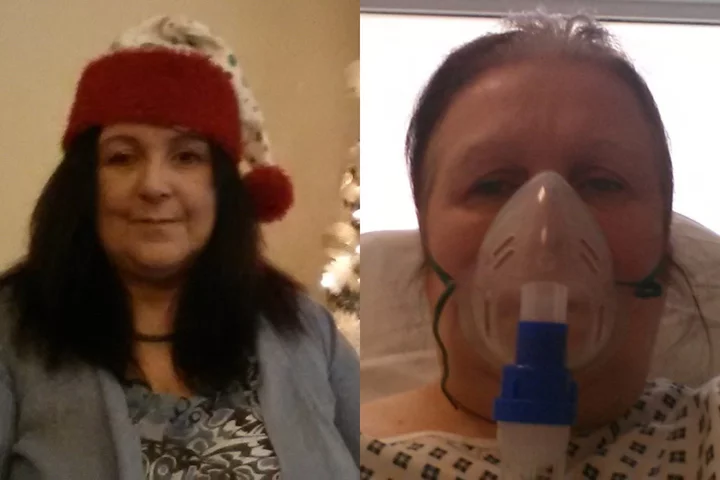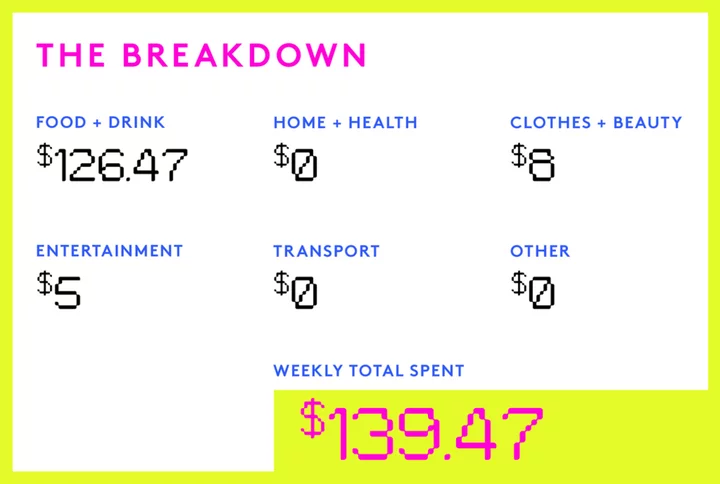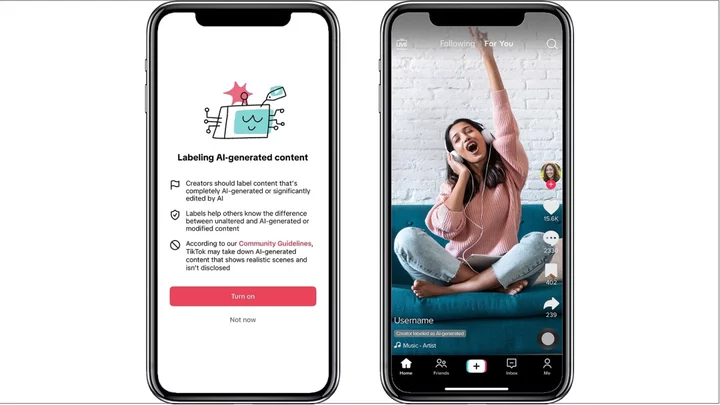
Katie Jane Hughes Created The Glass Skin Kit Of Our Dreams
As Refinery29’s resident CEO of Glow (a title I gave to myself and no one else knows about), it’s crucial that I find members of my clan of luminescent people. For those who have been told their entire lives they have too much highlighter on, I speak for you. But I couldn’t have made it to the top of the Glow Tower (created entirely of bottles of Pixi Glow Tonic) without the works of makeup artist Katie Jane Hughes, who shined and gleamed so I could glow.
2023-10-14 04:00

Woman forced to stay at home at Christmas because the smell of mince pies ‘could kill her’
A woman so allergic to the scent of Christmas that even “smelling a mince pie could kill [her]” almost died after a festive trip to a garden centre sparked an asthma attack. Anne Murray, 61, an engineer who lives alone in Lanark, Scotland, was diagnosed with severe asthma as a baby and has been allergic to traditional festive staples such as citrus and cinnamon since she was a child. According to the NHS, severe asthma means the condition is uncontrolled even when sufferers are taking their medication. When they are exposed to an allergen that irritates the airways, it can trigger asthma symptoms. Murray realised the seriousness of her condition at the age of 11 when her mother, Mary, collapsed and died from an asthma attack at the age of 34. Seven years later, Murray’s childhood best friend, Julia, also died from an asthma attack. Both deaths made her “live life to the full” and she has since done a bungee jump and travelled the globe. Murray had a near-death experience herself in November 2016 when she smelt “pine cones impregnated with citrus” in a garden centre. “I had difficulty breathing,” she recalled. “I grabbed my inhaler and ran quickly out of the garden centre.” On the drive home, her condition worsened. “It felt like someone was sitting on my chest.” Once home, she used her nebuliser – a device that enables her to breathe by giving her medicine as a mist – but could not get to sleep that night as she kept coughing, and whenever she laid down, it felt like she was “choking”. Two days later, and still struggling to breathe, she visited her GP and was barely able to stand up. An ambulance was called straight away, and Murray was given oxygen and strong nebulisers, before returning home with seven days’ worth of steroids. “They all told me it was a close call so it was lucky I had my nebuliser on me.” Since that incident, Murray has finished her Christmas shopping by September to avoid being near festive smells in shopping centres, and often turns down invites to Christmas parties. “It can be quite isolating,” she says. “If friends want to go out around Christmas, I have to ask them to go to different places where I know are safe. I can’t eat or be anywhere near things that smell like Christmas, or eat anything Christmassy like mince pies and stollen cake – I don’t touch them with a 10-foot barge pole. Just smelling a mince pie could kill me. So many things have Christmassy spices that you wouldn’t normally think of, too.” Following the dual losses of her mother and best friend, Murray learnt that she would have to make day-to-day adjustments to her life in order to maintain her own safety. When travelling, she often has to call the airline in advance to request that passengers only eat or peel oranges once they get off the plane. She also has to inform all her work colleagues not to wear festive perfume in the office. “I wish shops would put up signs saying they have festive scents in store,” she adds. “It would be so helpful for me, and stop them getting complaints too.” Today, she makes sure to keep her own Christmas planning low-key. “I don’t go anywhere near supermarkets and that sort of thing – it’s not worth the risk,” she says. “It can be embarrassing a lot of the time – if I go to a restaurant and tell them about my allergies, I get turned away and we have to find somewhere else to go. Or, I get loads of staff around me and I just don’t want the attention.” This year, Murray is looking forward to spending Christmas Day alone and visiting her dad, Archie, and stepmum, Alice, in Scotland. She says: “I still like Christmas, and I’m excited to be on my own this year – I can put my feet up and watch the telly, and eat whatever I want.” Read More Beauty advent calendars 2021: Our guide to this year’s top treats 13 best tech gifts to spoil a gadget geek this Christmas 10 best luxury Christmas crackers for dressing up your dining table Revealed: Healthy mental health patients trapped in hospitals for years Major study focuses on key lifestyle change that can add decade to life expectancy Paris Hilton opens up about welcoming ‘angel’ baby London: ‘I’m loving my mom era’
2023-11-29 01:45

Planned Parenthood will resume abortions in Wisconsin next week after judge rules 1849 state law doesn't apply
Planned Parenthood of Wisconsin says they will resume abortion care services next week after a judge ruled a state law from 1849 did not apply to abortion procedures.
2023-09-15 05:19

Crystelle Pereira: ‘This is controversial but... French food isn’t that great’
Crystelle Pereira can’t believe how time has flown in the two years since she competed in the Great British Bake Off. “Since I hit send on that application, it’s literally felt like I have just hit, like, times 10 in speed of life!” she tells me, wide-eyed, on a video call from the home in North London she shares with her parents and one of her two sisters. The 28-year-old – who finished runner-up to Giuseppe Dell’Anno in the 2021 season – was working in a fast-paced finance job when she took part. Landing a book deal shortly after the series aired (seven publishers were vying for her signature), she waited seven months before handing in her notice to pursue a cookery career. “I wouldn’t say I’m a pessimist, but I’m a realist,” the London-born cook says. “It’s very easy to quit your job and think, ‘Oh my gosh, I’m famous, this is great’. But I thought, ‘I don’t want to quit my job blindly and chase my dreams’. I need to think, ‘Is this viable? Can I actually get work?'” How did she decide to finally take the plunge? “It got to a point where I was like, I’m just working two full-time jobs – I’ve got no more annual leave, I’m about to burn out. “And also I need to grab this opportunity with both hands and just do it [otherwise] I think I’ll always regret it.” She hasn’t looked back since: “Honestly, it’s the best decision I’ve made. [Cooking] is literally my full-time job, it’s no longer a side hobby that I rush to do after I finish a long day of work. “It means I’ve got more time to really put into my job, I’m free to go on trips to Italy to look at Parmesan,” (an excursion she’s embarking on soon) “and obviously doing my book took up so much time.” Flavour Kitchen, her debut cookbook, is a colourful ode to Pereira’s Portuguese-Goan heritage (her parents met in Mumbai before moving to the UK). Split into two halves, the savoury section features brunch bites, curries, pasta, noodles, salads and more, all bursting with international flavours, such as Goan chilli chicken fry, kimcheese toasty, and honey and chipotle baked camembert. The sweet half is all about cakes, cookies, pies and other treats with a twist. Bake Off fans will remember the pistachio, orange and cardamom carrot cake Pereira created for her final Signature Challenge. “Goa is in the south of India, and it was colonised by the Portuguese,” Pereira says, which is why Goan food is so different to the rest of Indian cuisine. Vindaloo curry, for example, has its roots in Europe: “The Portuguese had this dish called carne de vinha d’alhos, a pork and wine dish. The Goans took that and swapped Portuguese wine with Goan vinegar and that became vindaloo.” Many of the savoury recipes in Flavour Kitchen feature a liberal splash of the tangy liquid. “Our food is very vinegar-based, which sounds a bit off-putting but it just works because it’s all balanced really well,” Pereira says. “If something’s got lots of vinegar, then it’s offset with something sweet like jaggery, which is an unrefined sugar, or coconut, because coconuts are in abundance in Goa.” Given the choice, the adventurous cook would much rather tuck into fiery fish curry, egg fried rice with Korean gochujang chilli paste or noodles with “about 10 cloves of garlic” than a plate of pretentious haute cuisine. “I will be honest, this is really controversial…” she begins, pausing before admitting: “I’m not that big on French food.” Conceding that Parisian pastries are unbeatable, she continues: “I’m just more into pan-Asian and Mediterranean food – I just think the flavours are a bit more vibrant. “Like you think about South Korea, you think about gochujang; in Greece you think about fresh mint, coriander, lemon, halloumi; Mexico, you’ve got chipotle; go to the Middle East, you’ve got harissa, ras el hanout [spice mix], all these flavours.” The cook credits her mum and dad’s cooking for helping her develop a taste for the exotic, and her late grandad – to whom she dedicates the book – with overseeing her success. “He sadly he passed away before any of this took off, but I genuinely believe in life after death – I genuinely believe he’s been a big part in guiding me through all of this. “I think he just knew l was going to end up in food. Funnily enough he used to call me MasterChef – we used to watch a lot of cooking shows together.” Having amassed 190,000 Instagram followers and cooked live on Good Morning America, The Today Show and ITV’s Lorraine, Pereira is well on her way to celebrity chef status. There have been many a pinch-me moment during her first year as a fully-fledged foodie, none more surreal than when she met King Charles (at that point still a Prince) at a Queen’s Jubilee lunch event last summer. “[Charles and Camilla] turned up and I thought, ‘I’m sure they won’t come over to speak to us,” Pereira recalls. “All of a sudden he’s walked over and said, ‘Oh, do you mind if I sit there? Because there was a seat next to me.” What did the pair talk about? “I think I was just word-vomiting! I said ‘Do you like baked goods?’ and ‘Do you bake?’ “The general consensus was he doesn’t bake, but he does like to eat. He likes cakes, he likes Italian cuisine. And then I was just talking to him about my style of baking and stuff. We had a merry old chat!” As well as finding herself starstruck by royals, Pereira has had to get used to being recognised by fans: “It literally happened the day after the first episode, which was wild. “I was going to work, I was on the train platform – I had a mask on my face, which is even funnier. This girl comes up to me and goes, ‘Oh my gosh, are you Crystelle from Bake Off?” Though she was recently “so embarassed” to be spotted at the end of spin class while “red and sweaty”, being asked for selfies is a small price to pay for being able to live out her dream. “I will never complain,” she says. “Like, no one’s there like throwing things at me! If I bump into anyone on the train or on holiday or whatever everyone is genuinely so lovely, so it’s actually just really nice to be honest.” ‘Flavour Kitchen: Vibrant Recipes with Creative Twists’ by Crystelle Pereira (Kyle Books, £22).
2023-06-14 13:59

As drinkers shift to spirits, Molson Coors acquires a bourbon maker
Molson Coors, best known for brewing Coors Light and Miller Lite, is acquiring Blue Run Spirits, a cult favorite high-end bourbon and rye whiskey brand, for an undisclosed price, exclusively told to CNN.
2023-08-08 20:59

International romance reigns supreme in sweet 'Red, White, and Royal Blue' trailer
One toppled wedding cake is all it takes to start a romance in the trailer
2023-07-07 00:50

Get productive with a new-to-you Acer monitor, now $130
TL;DR: As of July 24, get a refurbished Acer 24-inch HD monitor for just $129.99
2023-07-24 17:53

Presenter Louise Minchin: Menopause conversations are no longer taboo – but we need to keep going
Menopause awareness has come a long way in recent years – especially in the workplace. This stands to reason, as nearly 80% of menopause-age women in the UK are in work, according to the Faculty of Occupational Medicine (FOM). In fact, according to ONS figures, menopausal women are the fastest-growing demographic in the workforce. While menopause isn’t challenging for everyone, around three-quarters going through it will experience symptoms – such as brain fog, impaired sleep, hot flushes, anxiety and mood changes – and for one in four women, the impact is severe. Celebrities like Davina McCall have worked hard to tackle taboos and open up conversations around menopause, and a lot has been going on behind the scenes to improve things across healthcare and the workplace. As World Menopause Day 2023 (October 18) approaches, three key figures in the field share their thoughts on the progress so far, and what needs to happen next… Louise Minchin, TV presenter, author and journalist “Progress has definitely been made in respect of people feeling able to speak up. Even if they don’t yet have the answers, people know they can ask the questions – the conversation is no longer taboo, which is brilliant,” says Minchin, who has been at the forefront of menopause conversations in the media. “There’s so much more in the public domain on menopause now, and this enables people to have more of a handle on the topic, and a much better idea where to find help.” In terms of what needs to happen next, she adds: “Employers should be much clearer on how to access training, advice and signposting services that will help their employees work through menopause. Guidelines are all well and good, but [people] need clarity – they need action plans, access to expert trainers and well-informed educators to help them understand and meet their responsibilities and obligations. “It’s important to change the culture, as only when this happens can people open up about what’s happening to them. If you have a supportive and open culture, people feel able to continue in their jobs with the changes that might be needed,” says Minchin – adding that it’s also important to remember “not everyone wants to share or will feel comfortable talking about their situation or their symptoms”, and that needs to be respected too. “We must keep going until we reach the point where we don’t even have to have a conversation about what employers are doing to support colleagues through menopause – because they just are.” Deborah Garlick, CEO of Henpicked: Menopause In The Workplace “In terms of progress, we’ve seen a significant increase in the number of employers taking menopause in the workplace seriously. Seven years ago, no employers had a menopause policy or guidance document. “Today, research suggests around half do, and we have hundreds of employers working towards The Menopause Friendly Accreditation to prove and demonstrate the remarkable, positive impact they’re making for their colleagues,” says Garlick, referencing a scheme set up to show employers ‘have a clear understanding of how menopause can have an effect at work’ and that they ‘care about the wellbeing’ of women at work. “Next we need to see every employer commit to being menopause friendly by putting their menopause policy into action. This is urgent, important and critical for organisational success, particularly with the double threat of our ageing population and the shrinking talent pool,” adds Garlick. “Employers who fail to look after people working through menopause will fall behind.” Rt Hon Caroline Nokes MP, Chair of the Women and Equalities Committee “We’ve made progress on the taboo and stigma, but we need healthcare to up its game. Too many women are still being told they’re too young, it’s depression, you can manage without HRT,” says Nokes, who heads up the cross-party committee set up in 2015 to scrutinise government work and spending around issues impacting women. HRT shortages also need to be tackled, Nokes adds: “You can’t be at your awesome best if you’re anxious about whether your next prescription will be filled – and that is in itself a workplace issue. If we are worried about productivity as a nation, then we need to give menopausal and perimenopausal women the tools to be as productive as possible.” Read More Online apps recommended to manage lower back pain From choppy bobs to fox red, 5 celebrity-approved hair trends for autumn The UK’s first dedicated male breast cancer organisation has launched How Taylor Swift’s style has evolved over the years Model Emily Ratajkowski unveils latest fashion campaign 10 ways to cosy-up your home for an autumnal vibe
2023-10-13 19:59

All hail the rising sun! Stonehenge welcomes 8,000 visitors for the summer solstice
Around 8,000 revelers gathered around a prehistoric stone circle on a plain in southern England to express their devotion to the sun, or to have some communal fun
2023-06-22 00:56

The best dating sites to help you find a connection
This content originally appeared on Mashable for a US audience and has been adapted for
2023-09-06 18:48

Europe, US heatwaves 'virtually impossible' without climate change
Blistering heat that has baked swathes of North America and Europe this month would have been "virtually impossible" without human-caused climate change, researchers said Tuesday, as intense temperatures spark...
2023-07-25 13:20

The strange history of Taco Tuesday
The war over "Taco Tuesday" may be heating up now, but its origins date back several decades.
2023-07-04 20:52
You Might Like...

The best water filter bottles for every trip

A Week In New Hampshire On A $57,960 Salary

YouTube Music's 2023 Recap Is Here With 'Custom Album Cover' Just for You

American man arrested in Israel for smashing Roman statues in museum

TikTok to More Clearly Label Videos That Are AI-Generated

Video Game Performers Vote To Authorize Strike

Get An Exclusive Discount On This Skin-Care Routine For The Horoscope-Obsessed

Felipe Massa starts legal action over 2008 F1 title loss to Lewis Hamilton
